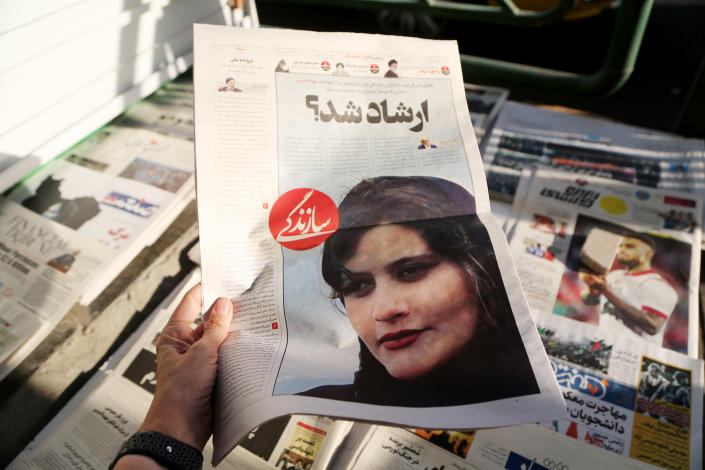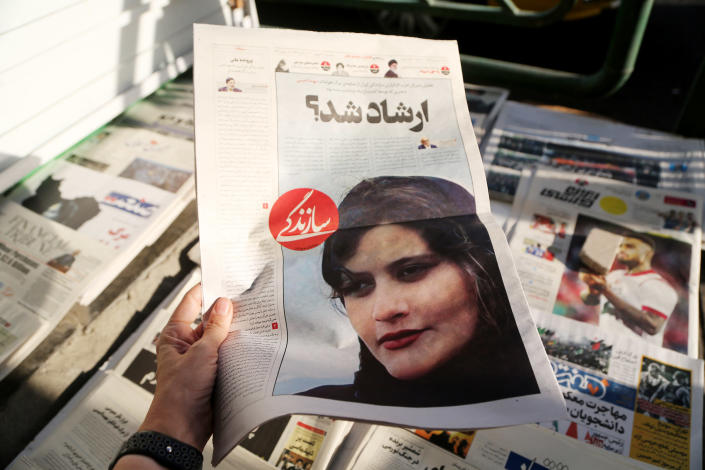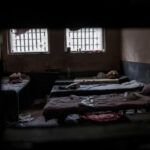TEHRAN, Iran — Iran’s army on Friday hinted that it was prepared to deepen its crackdown on protests triggered by the death of a young woman who had been detained by the morality police.
For almost a week, there have been running battles between demonstrators and security forces in almost 90 cities and towns. At least 26 people have died during the demonstrations, according to Iranian state television.
The military said it would “confront the enemies’ various plots in order to ensure security and peace for the people who are being unjustly assaulted,” government-aligned Tasnim News Agency reported, according to Reuters.
Protesters can be heard chanting various slogans in videos posted on social media. In one video uploaded on Twitter, a group of demonstrators in the city of Pakdasht shout, “Death to the dictator.” Another video shows demonstrators chanting, “Women, life, freedom,” and, “I will kill, I will, whoever killed my sister.”


Anger over the death of Mahsa Amini, 22, presents the government with its worst crisis in decades, according to Roham Alvandi, an associate professor of international history at the London School of Economics and Political Science.
“These protests have rocked the very foundations of the Islamic Republic,” he said.
“The message that a younger generation of Iranians is sending to their rulers and to the world is that the Islamic Republic is illegitimate in their eyes and they demand a secular democratic state that doesn’t interfere in their private lives,” he said.
The government has responded to demonstrations by blocking access to the internet and to the messaging apps WhatsApp and Telegram — a tactic it has used in the past, such as during protests in November 2019. Amnesty International said at least 300 people were killed during the crackdown that followed that unrest.
Some have warned the crackdown on the ongoing demonstrations will likely intensify.
“I think they will impose a harsh crackdown once [President Ebrahim] Raisi is back from New York,” said Ali Ansari, a professor of modern Middle Eastern history at the University of St. Andrews, referring to the Iranian leader’s trip this week to the 77th session of the United Nations General Assembly.
Iranian authorities, however, said Amini died from a heart attack and called the incident “unfortunate.”
Police said Amini died on Sept. 16 after falling ill and slipping into a coma days earlier as she waited with other women held by the morality police, who enforce the Islamic Republic’s strict rules requiring women to cover their hair and wear loose-fitting clothes in public.
Raisi has ordered an investigation into Amini’s death and has expressed condolences to her father in a phone call, according to Iranian state media.
Still, Raisi has remained steadfast in his public defense of security forces trying to quell the protests. Speaking at a news conference on the sidelines of the UNGA in New York on Thursday, Raisi said, “There is freedom of expression in Iran … but acts of chaos are unacceptable.”
Raisi has also showed other signs of his intention of making a statement out of women’s clothing.
While in New York, Raisi was scheduled to be interviewed by CNN journalist Christiane Amanpour. But Amanpour said she backed out after one of Raisi’s aides said it would not happen unless she wore a headscarf.


Amanpour, CNN’s chief international anchor, said she planned to ask Raisi about the protests that have swept across Iran.
In a Twitter thread, Amanpour chronicled how her scheduled interview with Raisi on Wednesday night fell apart, characterizing the request as an “unprecedented and unexpected condition.”
“I politely declined,” Amanpour wrote. “We are in New York, where there is no law or tradition regarding headscarves.”
NBC News could not immediately reach Raisi’s office for comment because the president’s office is closed until Saturday.
On Thursday, the Treasury Department imposed sanctions on Iran’s morality police, accusing it of abusing Iranian women and holding the unit responsible for Amini’s death.
“Iranians are literally risking their lives calling for social and political change,” said Jasmin Ramsey, deputy director of the Center for Human Rights in Iran, a nongovernmental organization headquartered in New York.
Ramsey said Amini’s father risked imprisonment by speaking to an Iranian media outlet and disputing the government’s version of events surrounding his daughter’s death.
“They said Mahsa had heart disease and epilepsy but as the father who raised her for 22 years, I say loudly that Mahsa did not have any illness. She was in perfect health,” Amini’s father told an Iranian news outlet.
Ali Arouzi reported from Tehran, Hyder Abbasi reported from London and Rhoda Kwan from Taipei.
This article was originally published on NBCNews.com




